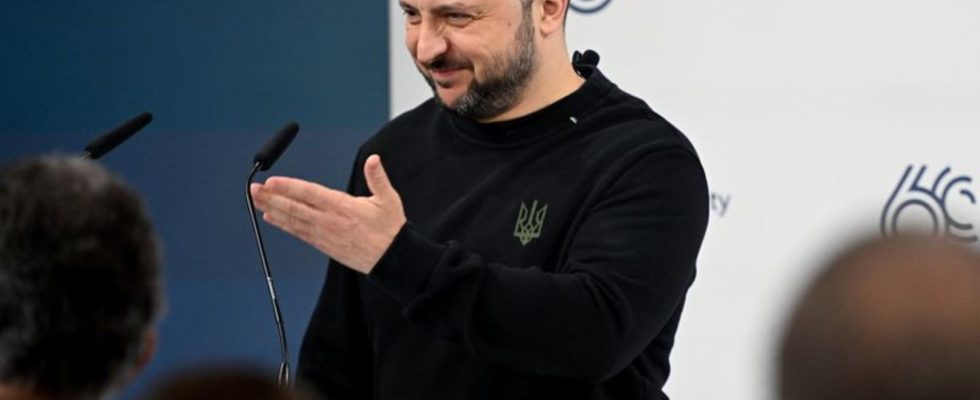Day two of the Munich Security Conference starts under the banner of the war in Ukraine. While Chancellor Scholz strives for confidence, President Zelenskyj outlines a bleak outlook for the future.
Shortly before the second anniversary of the Russian war of aggression, Ukrainian President Volodymyr Zelenskyj called for more long-range weapons systems. “There are no long-range weapons. Russia has them, we have very few of them. That’s the whole truth. That’s why our main weapons are precisely our fighters,” he said on Saturday at the Munich Security Conference. Ukraine’s actions are currently only limited by a lack of funds. “Weapons packages, anti-aircraft packages, that’s exactly what we expect.”
Zelenskyj spoke immediately after Chancellor Olaf Scholz (SPD) appeared. However, while Scholz tried to be confident in his speech and spoke of a “silver lining” on the horizon, Zelensky warned of incalculable consequences as a result of the “artificial weapons deficit” and “self-weakening”.
“2024 expects a reaction from all of us,” Zelensky said, according to the official translation. Ukraine has now stood against the Russian threat for 724 days. “Our resistance prevented the destruction of the rules-based world.” With a view to a future without war, Russia must be a thing of the past because the country does not follow the rules. The international community can still achieve this “if we do everything we can”. But the question is, “how long will the world allow Russia to act like this?”
Zelensky thanked the security agreements signed with Germany and France on Friday, which are a promise of long-term support and further arms deliveries. But he also warned urgently about the consequences of the war: the longer it lasts, the greater the risk of expansion and further damage to the international order.
Zelenskyj: Have to work in a team
“If we don’t act now, Putin will succeed in turning the next few years into a catastrophe,” said Zelensky, who also warned of dangers for other European countries in his speech: “We have to act together in a team. If Ukraine alone stands there, then you will see what happens: Russia will destroy us, destroy the Baltics, destroy Poland – it is capable of it.”
In his speech, Scholz had previously warned against weakening the will to common defense in NATO in view of the Russian threat. “Let me also make it clear: Any relativization of NATO’s guarantee of assistance will only benefit those who – like Putin – want to weaken us,” he said.
Scholz was obviously reacting to statements made by US presidential candidate Donald Trump, who made it clear during a campaign appearance that he would not provide American support to allies with low defense spending in the event of a Russian attack. For his part, Zelensky emphasized that he had already invited Trump to Ukraine.
At the same time, Scholz urged the EU partners to provide more financial aid for Ukraine, which was attacked by Russia – in the interest of their own security. For the current year, Germany has almost doubled its military aid to more than seven billion euros, with commitments for the coming years amounting to six billion euros, he said. He would very much like “similar decisions to be made in all EU capitals.”
No further clarity regarding Taurus
“We Europeans have to pay much more attention to our own security – now and in the future,” demanded Scholz. He emphasized that German support for Kiev was “broad and extensive, but above all it is long-term.” However, Scholz avoided the question of whether Germany might still deliver Taurus cruise missiles to Ukraine in an interview after his speech. He only assured that Germany would always do enough to support Ukraine.
Ukraine had already officially requested the missiles, which have a range of 500 kilometers and high accuracy, from the federal government last May. In October, Scholz declared that Germany would not deliver them for the time being. Behind this are fears that the cruise missiles could hit Russian territory.
Despite enormous losses of our own, significant parts of the Russian armed forces are intact, said Scholz. “Russia has been preparing its army for this war for many years and has developed new, dangerous weapon systems at all levels. The Russian economy has long been operating in war mode.” Putin is also sending more and more soldiers to the front. Two years after the start of the war, everyone should be asking themselves whether enough is being done to signal to Putin that they are ready for a long period of crisis. He also said: “We must be more concerned than ever about ensuring that our deterrence meets modern requirements.”
As in other countries, there are “critical voices in Germany who ask: Shouldn’t we spend the money for other purposes,” the Chancellor acknowledged. Moscow is fueling such doubts with targeted disinformation campaigns and propaganda on social media. “The money that we spend on our security now and in the future is missing elsewhere. We feel that,” admitted Scholz. “But I also say: without security, everything else is nothing.”

